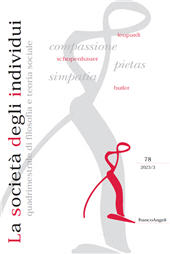"Passione lodevole" o "virtù assai sospetta"? : la compassione nella filosofia francese del XVII secolo
40-57 p.
The perception of compassion in seventeenth-century France relies mainly on ancient philosophy and on Christian thought. Though apprehended differently by various schools of thought (Thomism, Augustinism, neo-stoism and Cartesianism), it is most of the time considered to be a passion, and rarely a virtue. Its morality is debated: some speak of a praiseworthy passion, while others deny it any moral value, whether they see it as a product of self-love or as a purely physiological reaction. Although it is understood as both a feeling (an affection suffered) and an action (actual help given to others), the distinction is not al¬ways clearly theorised. Finally, the term 'compassion' proves to be synonymous with 'pity' and often, also, with 'mercy'. [Publisher's text].
Forma parte de
Società degli individui : 78, 3, 2023-
Artículos del mismo número (disponibles individualmente)
-
Información
Código DOI: 10.3280/LAS2023-078004
ISSN: 1972-5752
KEYWORDS
- Augustinism, Thomism, self-love, morality, physiology


